Backlinks. They're essential.
Why?
Because they can propel your website's ranking to new heights.
Let's break it down. People on Reddit suggest starting by figuring out if you actually need backlinks. Use tools like Ahrefs to compare domains and see why your competitors are winning.
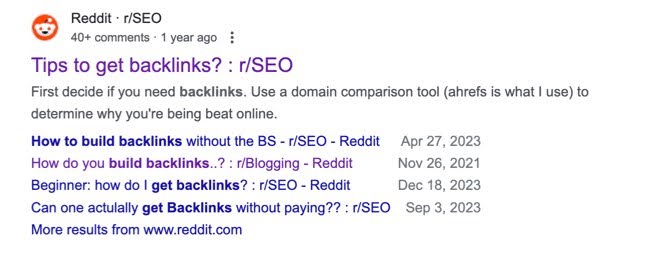
Here’s the deal. According to the same ol’ Ahrefs, Google has stated that backlinks are among its top three ranking factors. Additionally, more backlinks generally mean better search traffic and higher ranking positions.
Check these few fascinating link-building stats from our State of Link Building report:
- 92% of respondents believe competitors buy links;
- 71.1% think it's possible to rank high with quality content alone;
- 74.3% of SEO experts say Ahrefs offers the best backlink data;
- 84.6% prioritize relevance when assessing backlink quality.
So, why do people link? And how can you persuade them?
Understanding this is the first step to success.
In this guide, you’ll learn effective strategies and tips to get backlinks.
Whether you’re new to link building or a seasoned pro, these tips will help you enhance your SEO efforts.
Ready to master backlinks? Let's roll!
Why Backlinks Are Important
So when another website links back to yours, that's a backlink. It’s a signal to search engines that your content is valuable.
Now, 58.4% of SEO experts believe backlinks have a high impact on rankings. That's a strong endorsement from the pros!
Some folks on Reddit argue that internal linking and quality content come first.
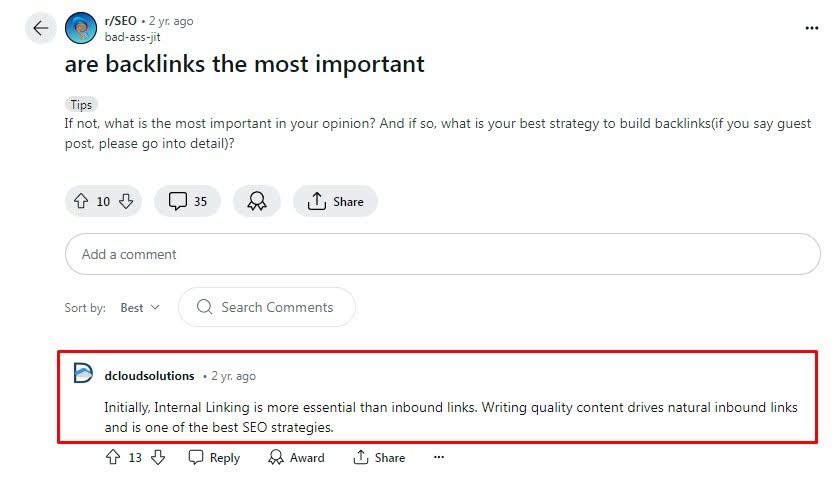

They’re not wrong. Quality content and internal linking are crucial. But here's the catch—backlinks still play a key role.
Think of it like this: Easier keywords might get you to the first page with good content alone. But as keyword difficulty rises, you need a strong content structure and solid backlinks.
Backlinks are votes of confidence. They show search engines that your content is trustworthy and authoritative.
More quality backlinks mean higher rankings and more visibility.
Remember, sites with the most backlinks usually top the search results. So, even though some prioritize content and internal links first, backlinks are still essential.
Want to learn how to get valuable backlinks?
Stick around.
The strategies are coming up next.
How to Get Backlinks for Your Website
You can earn backlinks when others naturally link to your content—this is the ideal scenario. Some websites allow you to add links manually, like posting on forums. You can also ask by reaching out to site owners and requesting a link. Lastly, there’s the option to buy links, either directly from website owners or through third parties, though this is a risky way.
Earn Backlinks
Earning backlinks is the gold standard. Why? Because they come naturally and are highly valued by search engines.
Imagine creating content so compelling that others can't help but link to it. That’s what earning backlinks is all about.
One effective strategy is to create linkable assets. These are resources so valuable that others want to share them. Think data-driven reports, in-depth guides, or unique tools.
- For example, check out the "History of Google Algorithm Updates" by Search Engine Journal. This page, filled with valuable insights, has attracted nearly 3,000 referring domains as of 2024.
That’s a lot of link juice if you ask me!

- Another standout example is CoSchedule’s Headline Analyzer tool. This one helps users craft compelling headlines and has earned over 16,000 backlinks from more than 3,600 referring domains. Tools like these are link magnets because they offer real value.
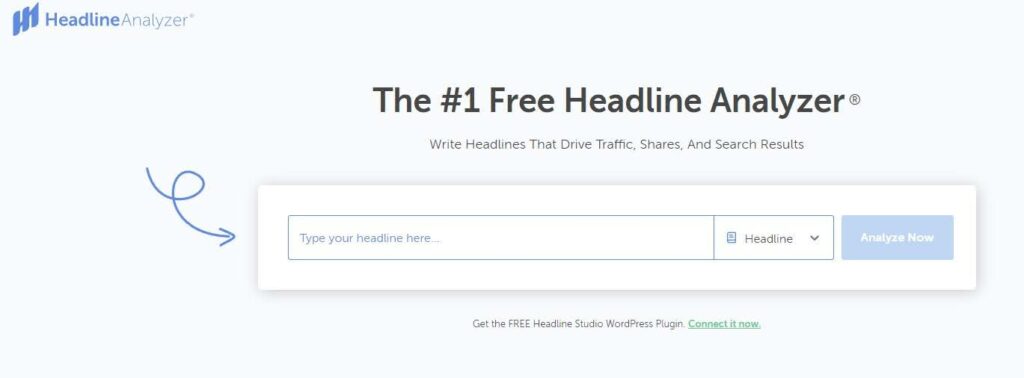
Creating high-quality pages that naturally attract backlinks involves a few key steps:
- First, you need to produce top-notch content. This could be a data-driven study, an engaging infographic, or an exhaustive guide;
- Next, promote your content to relevant publications and audiences.
Create something of high value, and the links will follow! For more tips on earning backlinks, check out my detailed guide on link earning.
Ask about link exchange
Ever heard of a backlink exchange?
It's a common practice in SEO.
According to our survey, link exchange one of the most effective link building tactic.
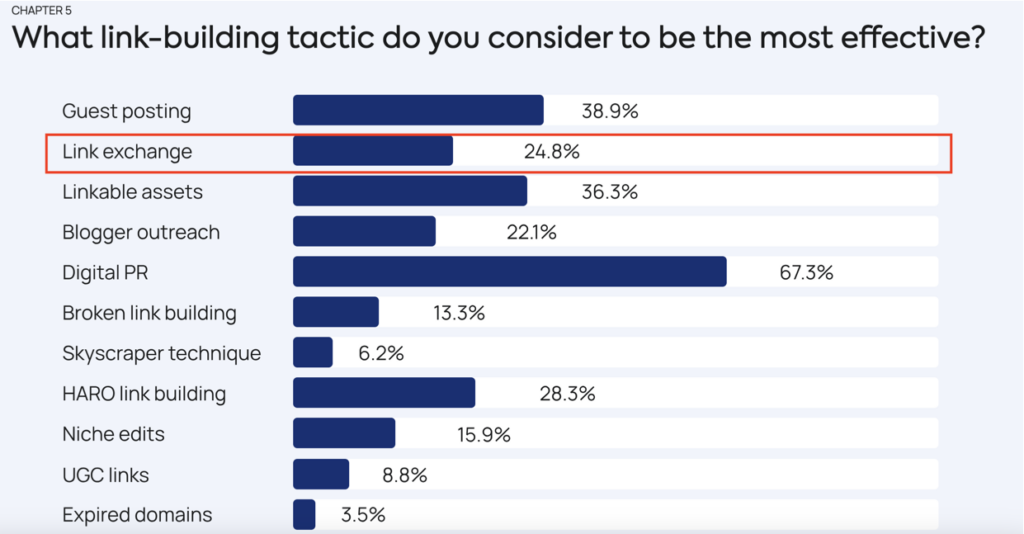
Here’s how it works: Site A links to Site B, and in return, Site B links back to Site A. Yup. Can’t get any easier. This strategy boosts visibility and search engine rankings for both sites.
It’s all about collaboration. A straightforward exchange can work wonders, but it can get more complex. Sometimes, three or even four sites are involved, creating a web of interconnected links.
The key is to offer value in return for a link.
However, just asking for a backlink isn’t enough. You need to make it worthwhile for the other party:
Offering a guest post is a great example. You provide valuable content, and in exchange, you get a link. Fair trade. But remember, quality is crucial.
You can't just slap together a quick article and expect results. High-quality content is essential for successful exchanges.
If you want to see this in action, check out the Skyscraper technique. Create the best content on a topic and reach out to relevant sites for a link. It’s a bit of a hustle, but it can pay off!
A word of caution: overdoing link exchanges can lead to penalties from Google. Keep it balanced and genuine.
Take a look at this guide on backlink exchange for a deeper dive into the topic.
Buy backlinks
If you’re thinking about buying backlinks, think twice.
Honestly, this isn’t the best route to take.
Fact is, quality sites don’t sell links.
Why you should be cautious? Many sites that sold links are now defunct. Below are just a few examples:
- J.C. Penney: Penalized in the past for manipulating search rankings with link schemes. This is a classic case of Google cracking down on paid links.
- Overstock.com: Penalized for offering discounts to universities in exchange for backlinks. Google saw this as manipulative.
- March 2024 Core Update: Google’s update led to the deindexing of over 800 websites involved in AI-generated content and link schemes.
Buying backlinks is always risky, and spam emails offering “high-DR backlinks” are red flags. So steer clear of those.
The safest backlinks to buy are from sites that don’t usually sell them.
For instance, sponsoring an event and getting listed as a sponsor on their website can result in a legitimate backlink.
🚨 Plus, as stated in our report, more than 90% of respondents believe that competitors buy links.
But beware.
Buying backlinks can quickly lead to penalties.
If you must buy links, hire agencies or freelancers to build them for you. They can use methods like guest posting and the Skyscraper technique without risking your site’s safety. Make sure to vet them by checking their previous work and client feedback.
Remember, earning backlinks naturally is always the best strategy.
Professionals can help you create content that attracts links organically, which is worth the investment.
If you’re not planning a career in SEO, consider outsourcing link building to experts. It’s safer and can be much more effective.
Hiring a link building agency
Hiring a link building agency like Editorial.Link might be your best bet. They’ll do the heavy lifting and get you the results you need.
Hiring an agency has its pros and cons.
Pros:
- Expertise: Agencies have the experience and skills to secure high-quality links;
- Efficiency: They save you time and effort, handling everything from strategy to execution;
- Resources: Agencies have established relationships with reputable sites and use advanced tools to get the job done;
- Case studies: Agencies highlight their success stories by showing clients' improved SEO rankings and organic traffic from effective backlink strategies;
- Reviews: Client feedback and testimonials reveal the agency’s performance and reliability, helping build trust and inform your decision.
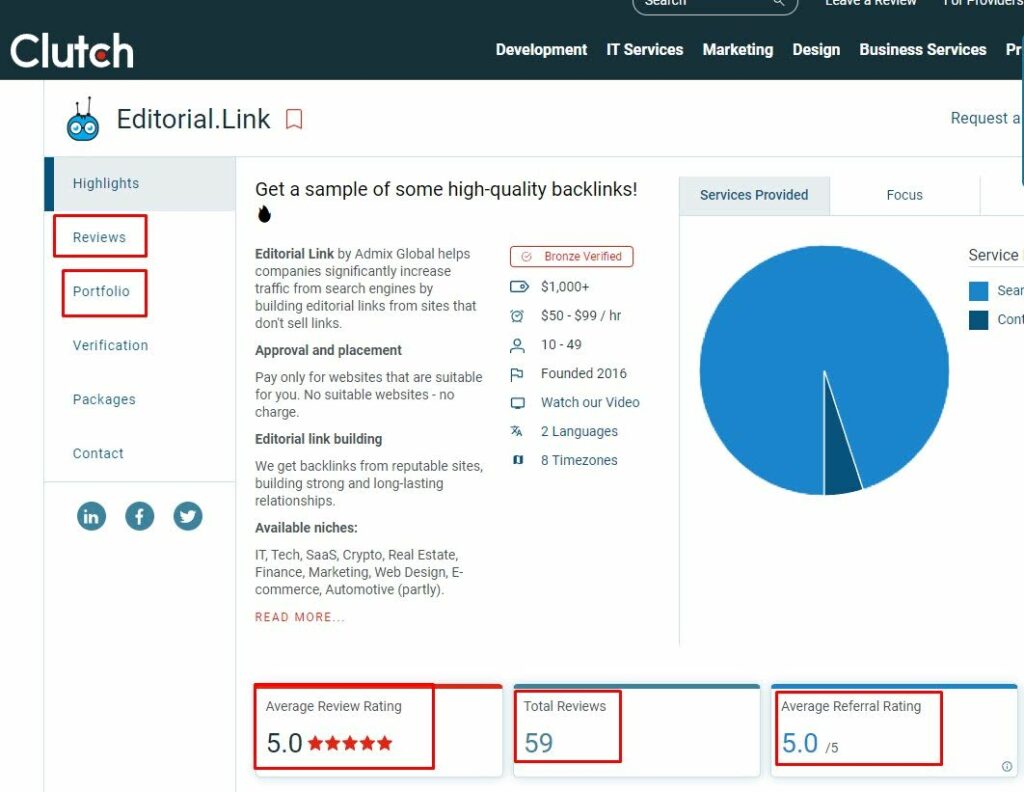
Cons:
- Cost: Hiring an agency can be pricey, taking a significant chunk of your SEO budget;
- Communication: Misunderstandings can arise if the agency doesn't fully grasp your vision or objectives;
- Adaptability: Agencies may not be as agile in responding to sudden changes or specific needs compared to an in-house team.
Despite the cost, hiring an agency can be worth it. You get access to a team of experts who can deliver top-notch results without the headaches.
Not all agencies deliver the same quality. It’s crucial to choose a reputable one that prioritizes quality, communication, and transparency. They’ll keep you updated and tailor their strategy to your needs.

For the best results, consider Editorial.Link. We focus on ethical practices and personalized strategies to boost your SEO without stress.
Find broken links
Broken links are links on a website that no longer work. They might lead to a 404 error, have an incorrect URL, or point to a moved or closed website. This is your opportunity.
Finding broken links is a classic SEO strategy that still works wonders.
Here’s how you can use it to get valuable backlinks:
- First, identify broken links on sites within your niche. Tools like Semrush or Ahrefs make this process simple;
- In Semrush, go to Backlink Analytics, and type in a domain related to your niche. Click on the “Indexed Pages” tab;
- Check the “Broken Pages” box. This will show any broken pages on the site;
- Click the numbers under the “Backlinks” column to see which sites are linking to these broken pages;
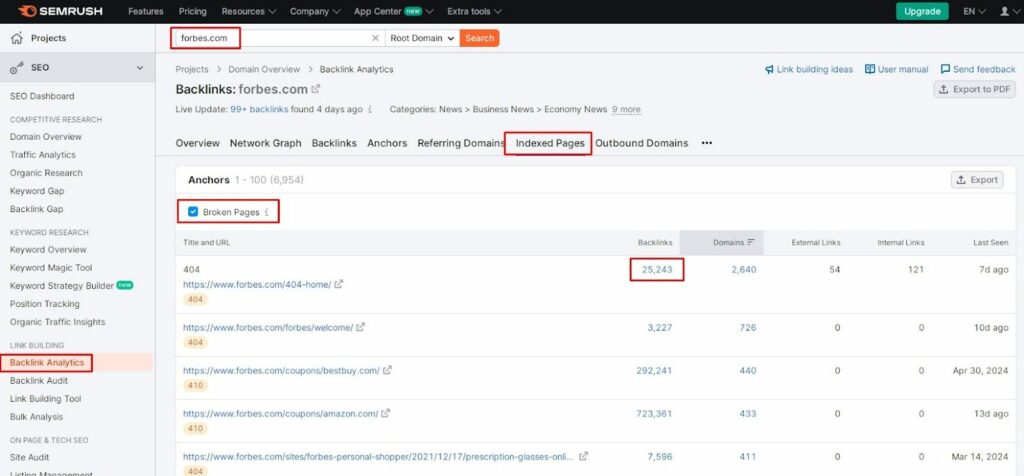
- Now, look for broken pages focused on topics you already have content for or can create content about;
- Click on the number of backlinks. You’ll see a list of all the domains linking to the broken page;
- Use the filters to sort through your results if needed. Check the “Anchor and Target URL” column to find the page URL and the anchor text used.
In Ahrefs, enter the website URL in Site Explorer and select “Broken backlinks” in the Backlink profile sub-menu, under the Backlinks options. This will show all the broken links for that site.
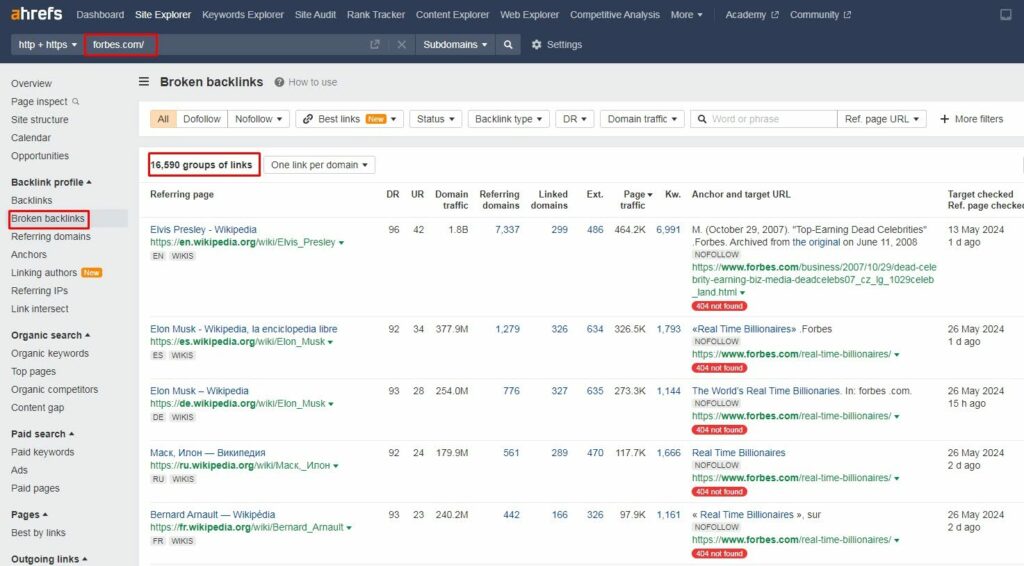
Once you have your list, it’s time to reach out.
Contact the webmaster and report the broken link. Be polite and introduce yourself. Point out the exact location of the broken link and kindly suggest your site as a replacement.
This method isn’t just about getting a backlink; it's about offering value.
You help the site owner fix a broken link and improve their user experience, and in return, you get a backlink and enhance your profile.
Reach out to journalists or influencers
Connecting with journalists and influencers is a smart move, so let’s see how blogger outreach and HARO link building can work out for you.
Blogger outreach
Blogger outreach is about getting the right people to talk about your content. No more sending generic emails to everyone.
Focus on quality.
The “sniper approach,” meaning precisely targeting key prospects, is your best bet:
- Identify key bloggers and influencers in your niche;
- Craft personalized messages that highlight the unique value of your content.
For example, if someone’s written about a topic similar to yours, reach out. Explain why your content offers fresh insights or valuable updates.
HARO link building
As you may be aware, HARO by Connectively officially shut down on December 9, 2024.

The closure of HARO by Connectively has left many of us in PR and marketing looking for other platforms to build premium backlinks and secure media coverage.
To help you with this change, I’ve created a guide to the best HARO alternatives.
This guide covers platforms that can easily replace HARO and keep your link-building and media outreach efforts on track.
With these alternatives, we can continue connecting with journalists and industry experts, ensuring our PR strategies remain effective despite the discontinuation of HARO.
Find competitors’ backlinks
Ever wonder where your competitors get their backlinks?
You have all the chances to uncover those hidden gems. All you have to do is find those sites that link to your competitors but not to you and then get those links for yourself.
Here’s how to do it.
- First, identify your competitors and analyze their backlink profiles. Tools like Semrush and Ahrefs make this easy.
- For instance, Semrush’s Backlink Analytics lets you enter a competitor’s domain and see all their backlinks.
Step-by-step guide
- Use SEO Tools: Open Semrush and go to Backlink Analytics. Enter your competitor’s domain.
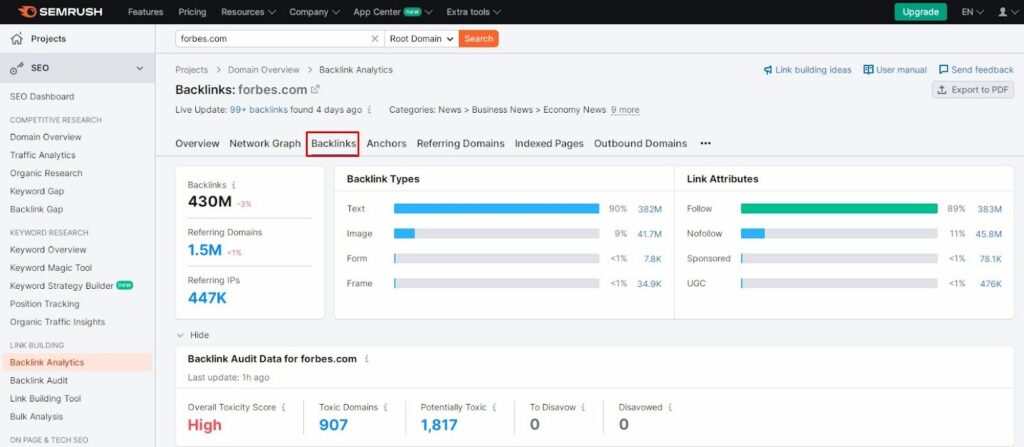
- Check Backlinks: Click "Backlinks" to see all the sites linking to them.
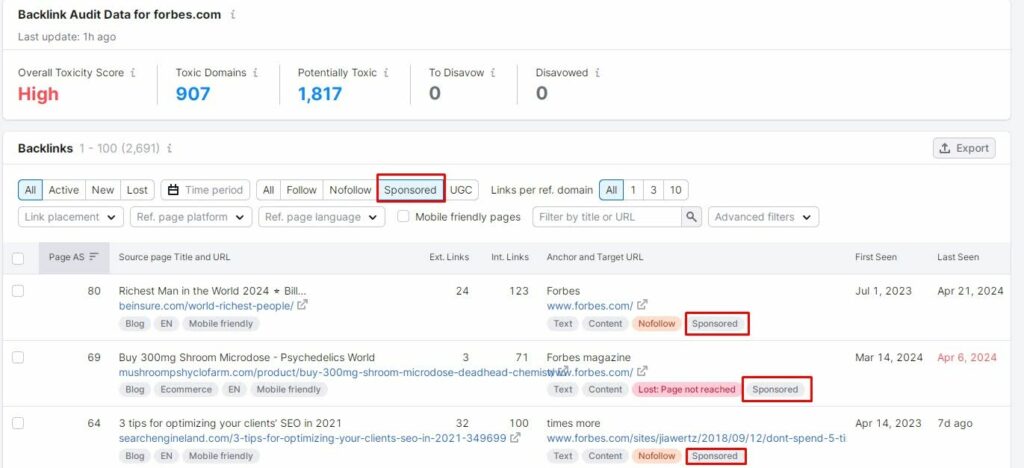
- Analyze Links: Look for patterns. Are there guest posts? Forum links? Identify opportunities.
If your competitor has a guest post on a high-authority site, pitch your own guest post to the same site. If they have links from forums, join those forums and contribute valuable content with your links.
As for Ahrefs, to find your competitors' backlinks, follow these detailed steps:
Free method
Backlink Checker:
- Visit Ahrefs' free Backlink Checker tool;
- Enter your competitor’s domain or specific URL;
- Review the top 100 backlinks listed.
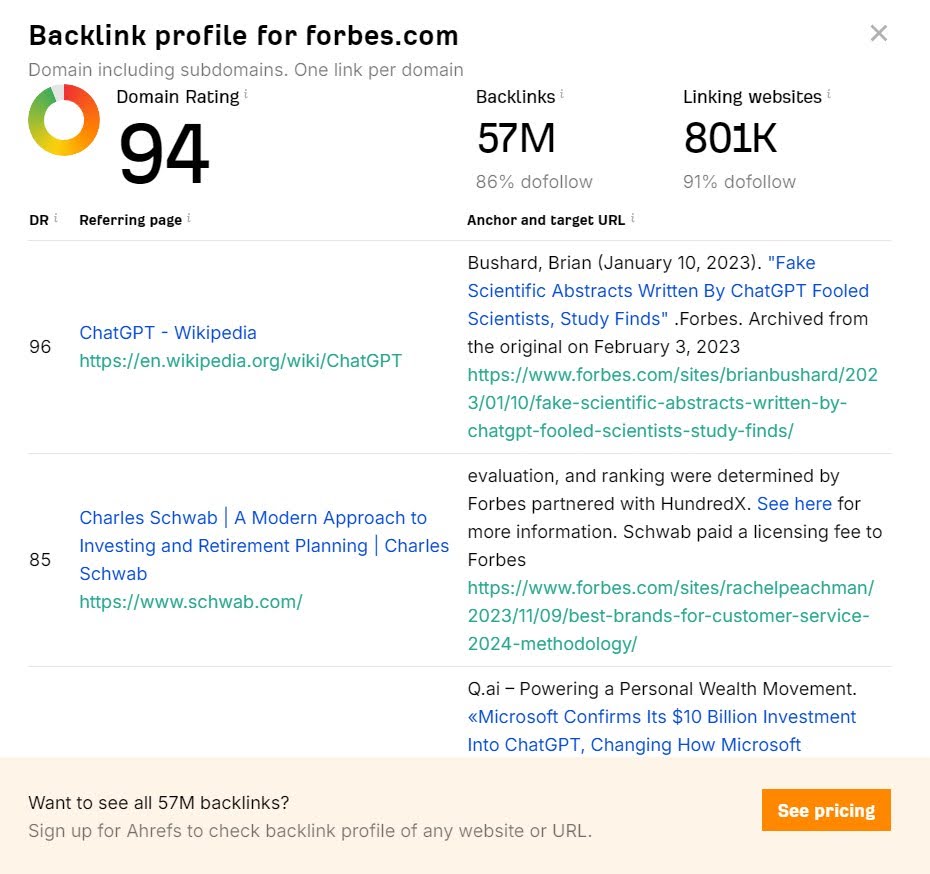
Paid method
Subscribe to Ahrefs for full access.
Site Explorer:
- Navigate to the Site Explorer tool.
- Enter your competitor’s domain.
Backlinks Report:
- Access the "Backlinks" report from the menu.
- Use filters such as link type, domain rating, and traffic to refine the list.
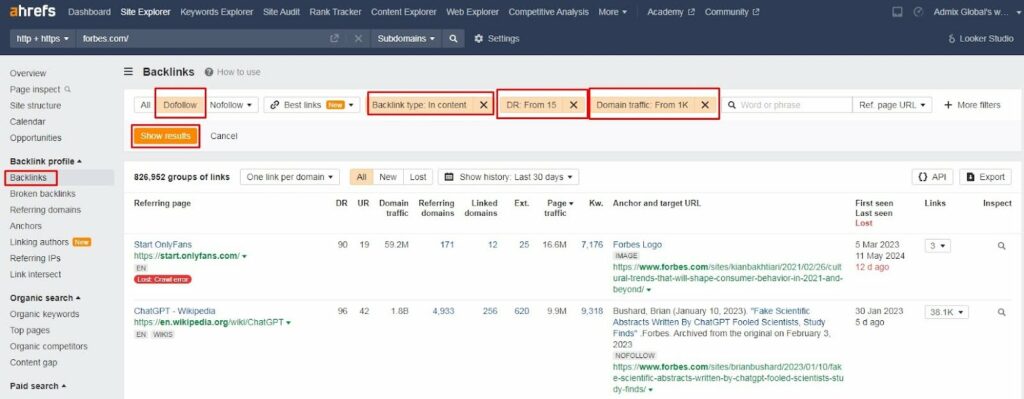
To refine the list of backlinks in Ahrefs, use these specific filters:
- Link Type: Filter by "Dofollow" links for SEO value;
- Domain Rating (DR): Set a minimum DR to focus on higher-quality backlinks;
- Traffic: Filter by pages with high organic traffic for more impactful links;
- Platform: Use the "Link platform" filter to focus on specific platforms like blogs, forums, etc.
Identifying competitors
Organic Competitors:
- In Site Explorer, enter your domain;
- View the "Organic Competitors" report to identify key competitors.
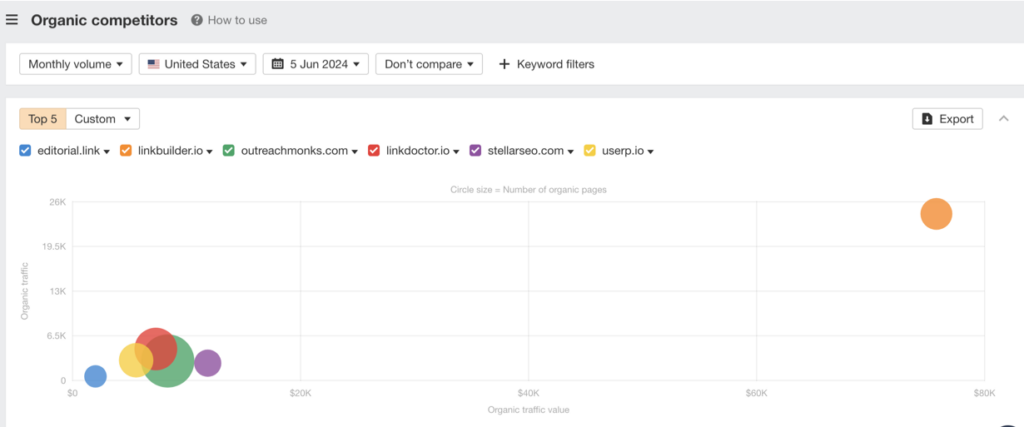
Analyzing your competitors' backlinks helps you find proven link sources. If a site links to multiple competitors, it’s likely they’ll link to you too.
For a deeper dive into this strategy, check out my detailed guide on competitor backlinks.
Final Thoughts
All in all, getting backlinks for your website is pretty easy. At least now you have a solid understanding of various strategies to do that.
Each method in this post, from earning and adding links to buying and finding broken links, offers unique benefits and challenges. So try them all!
Building legitimate backlinks isn't easy, and that's the point. Many look for shortcuts, but these can lead to penalties. Instead, focus on creating valuable content that naturally attracts links.
Remember, you're dealing with real people. Impress them with your content, and the links will follow.
Embrace the process, invest the effort, and prioritize quality over quantity.

